2024年人教版中考英语高频考点精讲-非谓语动词(无答案)
文档属性
| 名称 | 2024年人教版中考英语高频考点精讲-非谓语动词(无答案) |
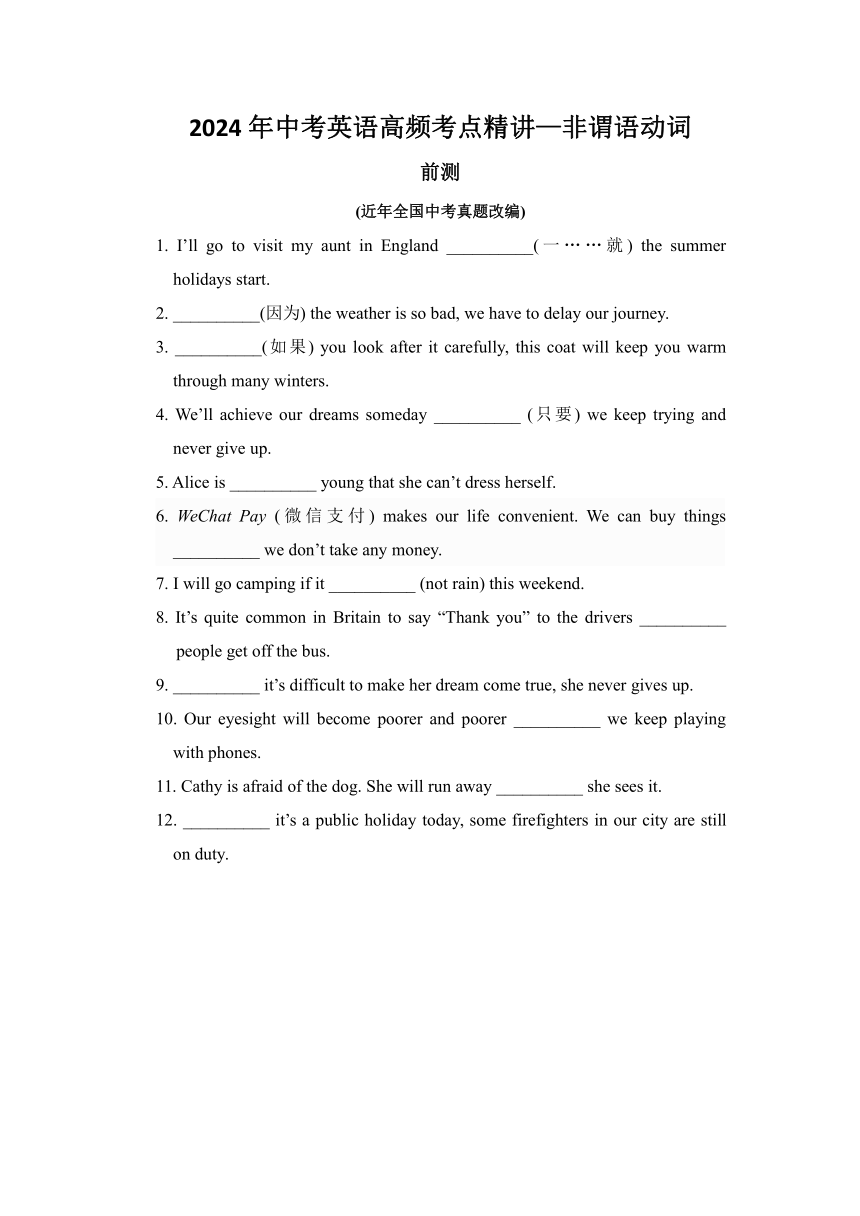
|
|
| 格式 | docx | ||
| 文件大小 | 196.4KB | ||
| 资源类型 | 教案 | ||
| 版本资源 | 人教新目标(Go for it)版 | ||
| 科目 | 英语 | ||
| 更新时间 | 2024-03-06 00:00:00 | ||
图片预览

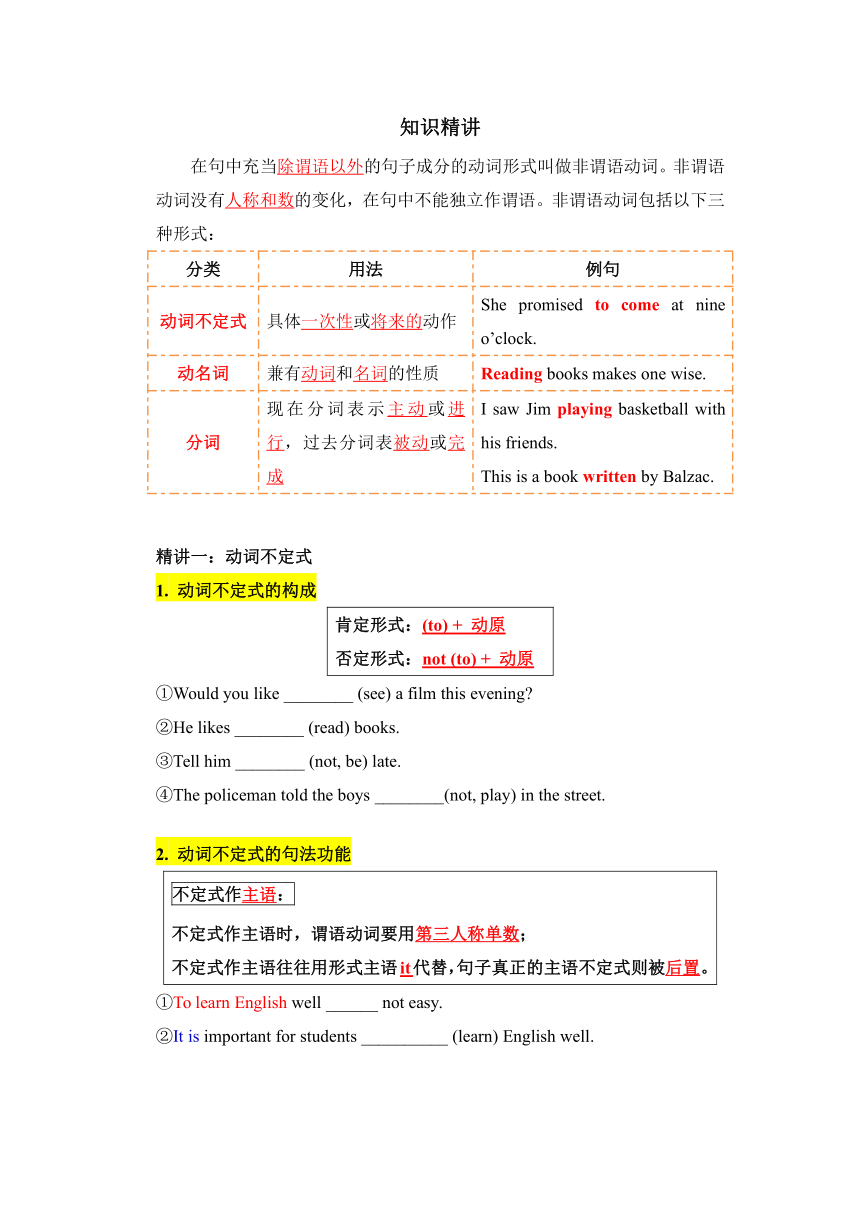
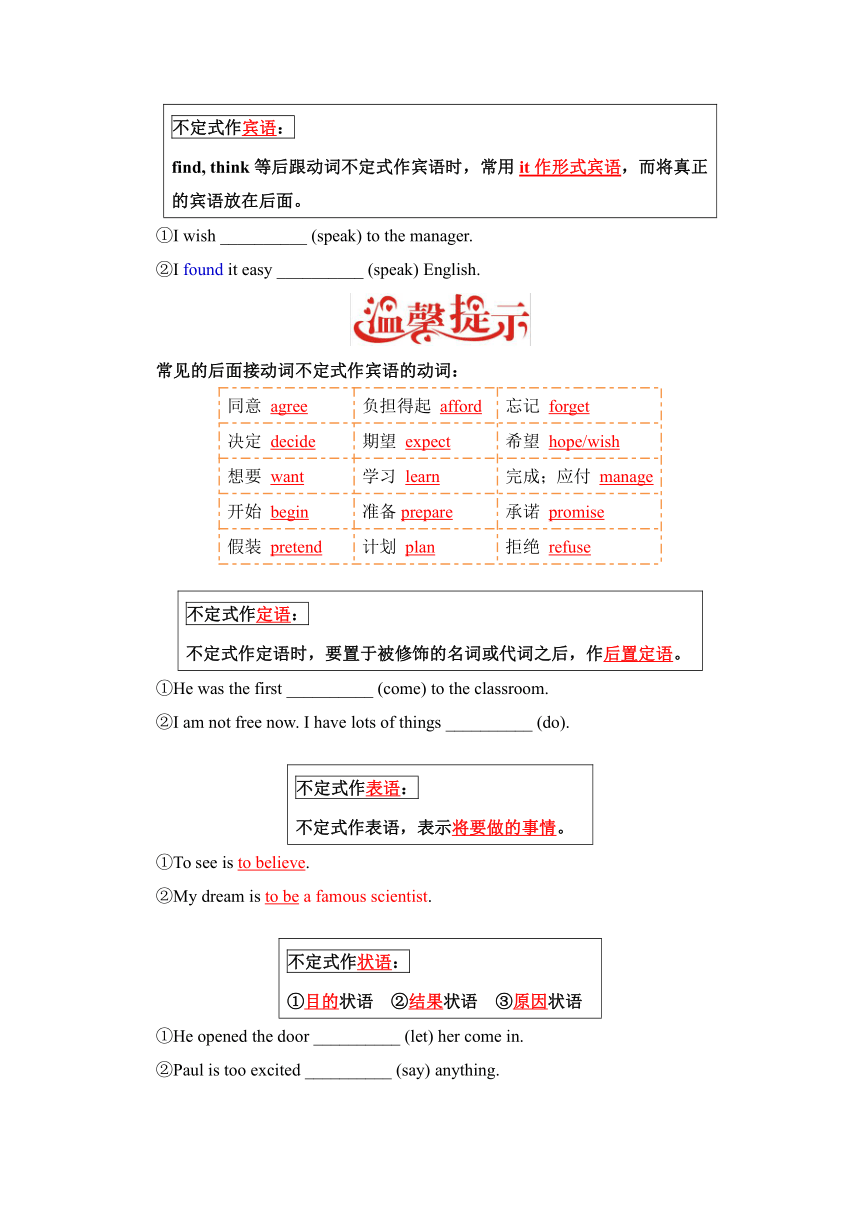
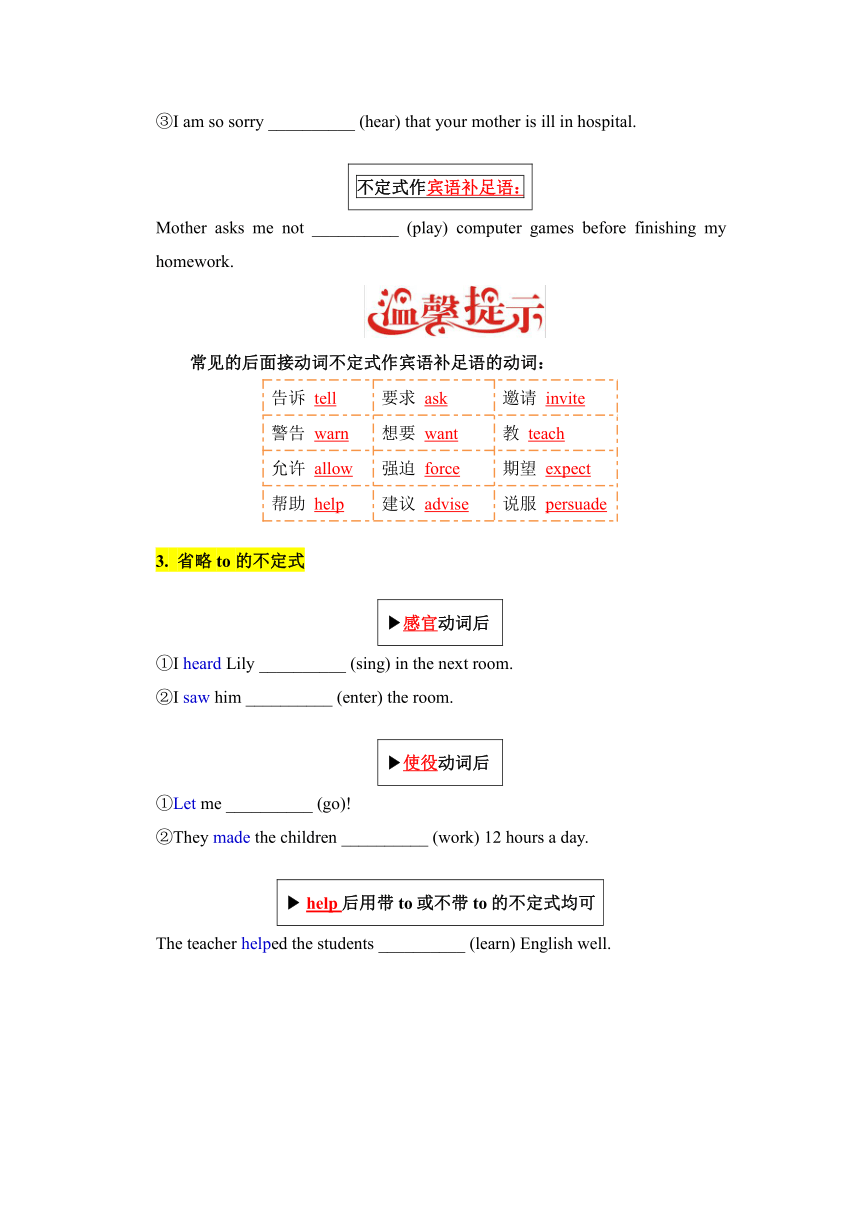
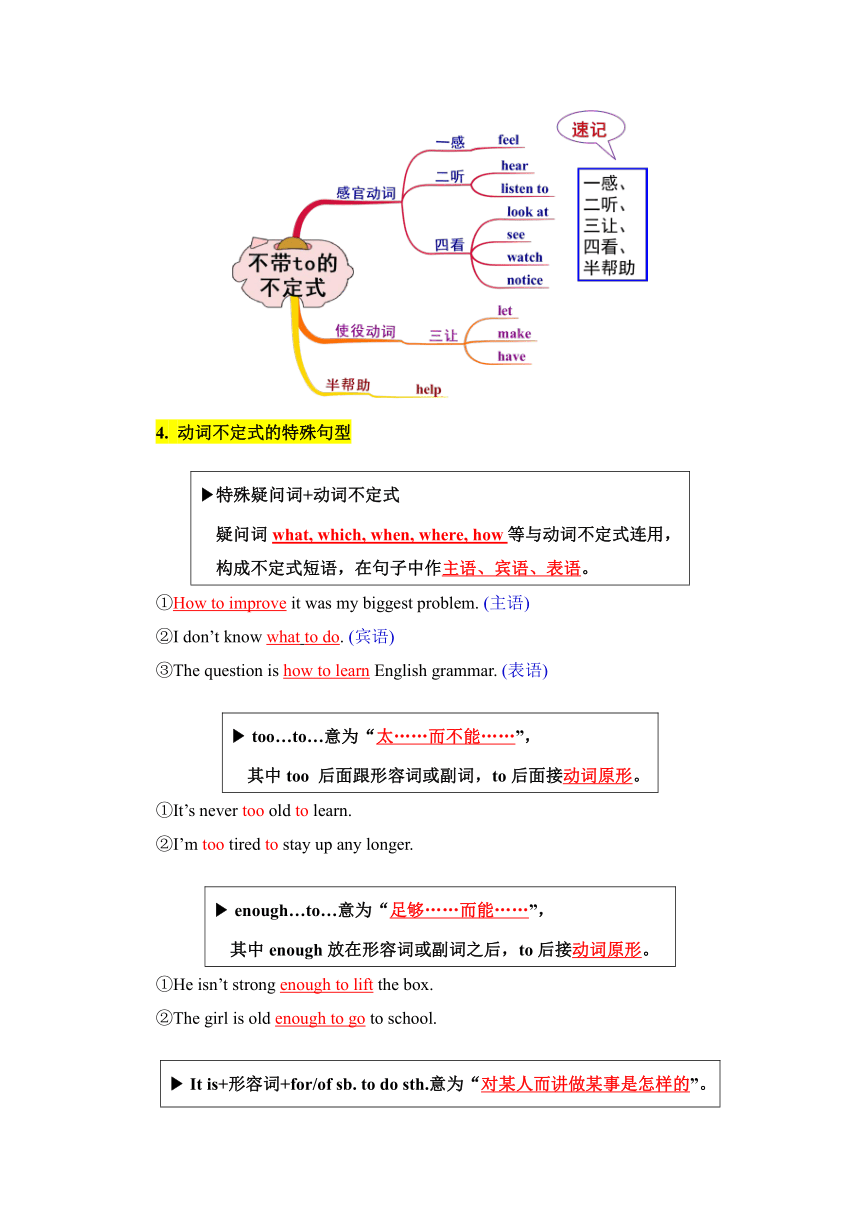
文档简介
2024年中考英语高频考点精讲—非谓语动词
前测
(近年全国中考真题改编)
1. I’ll go to visit my aunt in England __________(一……就) the summer holidays start.
2. __________(因为) the weather is so bad, we have to delay our journey.
3. __________(如果) you look after it carefully, this coat will keep you warm through many winters.
4. We’ll achieve our dreams someday __________ (只要) we keep trying and never give up.
5. Alice is __________ young that she can’t dress herself.
6. WeChat Pay (微信支付) makes our life convenient. We can buy things __________ we don’t take any money.
7. I will go camping if it __________ (not rain) this weekend.
8. It’s quite common in Britain to say “Thank you” to the drivers __________ people get off the bus.
9. __________ it’s difficult to make her dream come true, she never gives up.
10. Our eyesight will become poorer and poorer __________ we keep playing with phones.
11. Cathy is afraid of the dog. She will run away __________ she sees it.
12. __________ it’s a public holiday today, some firefighters in our city are still on duty.
知识精讲
在句中充当除谓语以外的句子成分的动词形式叫做非谓语动词。非谓语动词没有人称和数的变化,在句中不能独立作谓语。非谓语动词包括以下三种形式:
分类 用法 例句
动词不定式 具体一次性或将来的动作 She promised to come at nine o’clock.
动名词 兼有动词和名词的性质 Reading books makes one wise.
分词 现在分词表示主动或进行,过去分词表被动或完成 I saw Jim playing basketball with his friends. This is a book written by Balzac.
精讲一:动词不定式
1. 动词不定式的构成
肯定形式:(to) + 动原 否定形式:not (to) + 动原
①Would you like ________ (see) a film this evening
②He likes ________ (read) books.
③Tell him ________ (not, be) late.
④The policeman told the boys ________(not, play) in the street.
2. 动词不定式的句法功能
不定式作主语: 不定式作主语时,谓语动词要用第三人称单数; 不定式作主语往往用形式主语it代替,句子真正的主语不定式则被后置。
①To learn English well ______ not easy.
②It is important for students __________ (learn) English well.
不定式作宾语: find, think等后跟动词不定式作宾语时,常用it作形式宾语,而将真正的宾语放在后面。
①I wish __________ (speak) to the manager.
②I found it easy __________ (speak) English.
常见的后面接动词不定式作宾语的动词:
同意 agree 负担得起 afford 忘记 forget
决定 decide 期望 expect 希望 hope/wish
想要 want 学习 learn 完成;应付 manage
开始 begin 准备prepare 承诺 promise
假装 pretend 计划 plan 拒绝 refuse
不定式作定语: 不定式作定语时,要置于被修饰的名词或代词之后,作后置定语。
①He was the first __________ (come) to the classroom.
②I am not free now. I have lots of things __________ (do).
不定式作表语: 不定式作表语,表示将要做的事情。
①To see is to believe.
②My dream is to be a famous scientist.
不定式作状语: ①目的状语 ②结果状语 ③原因状语
①He opened the door __________ (let) her come in.
②Paul is too excited __________ (say) anything.
③I am so sorry __________ (hear) that your mother is ill in hospital.
不定式作宾语补足语:
Mother asks me not __________ (play) computer games before finishing my homework.
常见的后面接动词不定式作宾语补足语的动词:
告诉 tell 要求 ask 邀请 invite
警告 warn 想要 want 教 teach
允许 allow 强迫 force 期望 expect
帮助 help 建议 advise 说服 persuade
3. 省略to的不定式
感官动词后
①I heard Lily __________ (sing) in the next room.
②I saw him __________ (enter) the room.
使役动词后
①Let me __________ (go)!
②They made the children __________ (work) 12 hours a day.
help后用带to或不带to的不定式均可
The teacher helped the students __________ (learn) English well.
4. 动词不定式的特殊句型
特殊疑问词+动词不定式 疑问词what, which, when, where, how等与动词不定式连用,构成不定式短语,在句子中作主语、宾语、表语。
①How to improve it was my biggest problem. (主语)
②I don’t know what to do. (宾语)
③The question is how to learn English grammar. (表语)
too…to…意为“太……而不能……”, 其中too 后面跟形容词或副词,to后面接动词原形。
①It’s never too old to learn.
②I’m too tired to stay up any longer.
enough…to…意为“足够……而能……”, 其中enough放在形容词或副词之后,to后接动词原形。
①He isn’t strong enough to lift the box.
②The girl is old enough to go to school.
It is+形容词+for/of sb. to do sth.意为“对某人而讲做某事是怎样的”。 of sb.句型一般用来表示主观感情或态度的人称形容词,如: good, kind, nice, clever, foolish, right, wrong, careful等。 for sb.句型通常使用表示客观情况的非人称形容词,如: easy, difficult, hard, important, possible, interesting等。
①It’s kind ______ you to say so.
②It’s important ________ us to learn English well.
had better (not) do sth. 意为“最好(不要)做某事”
You had better not _______ (eat) too much.
Why (not) do … 意为“为什么(不)…… ”
Why not _______ (go) out to eat tonight
即时训练
1. —In my opinion, animals shouldn’t be kept for fun.
—I think so. Forests are the best places for animals ___________ (live) in.
2. Mrs. Green refuses ___________ (eat) sweet food. She doesn’t want to get fat.
3. Michael visits many websites ___________ (learn) about Chinese culture.
4. The government is setting up nature parks ___________ (help) protect pandas.
5. He took off his expensive watch ___________ (hide) the fact that he was rich.
6. It seems that it is going to rain. You’d better ___________ (leave) the windows open when you leave the house.
7. Father often tells me ___________ (spend) too much time on computer games.
8. —What should I do, doctor
—___________ (keep) healthy, you should take more exercise.
9. The show was so funny that it made everyone ___________ (laugh) again and again.
10. He is not old enough ___________ (go) to school.
精讲二:动名词
1. 动名词的构成
动词原形+ing
2. 动名词的句法功能
动名词作主语: 谓语动词用单数形式,且常用it作形式主语,把真正的主语后置。
①Saying so much ______ (be) useless.
②It is a waste of time talking to her.
动名词作宾语: 表示一般的习惯、抽象行为或经常性的动作。
①I like ________ (play) football very much. (动词宾语)
②I have no experience in ________ (teach) English. (介词宾语)
动名词作表语: 动名词作表语可以转换为动名词作主语。
His job is teaching Chinese in a school.
=________ Chinese in a school is his job.
动名词作定语: 表明被修饰词的用途、性质等,位于被修饰词之前。
We need a washing machine.
常见的后面接动名词的词(短语)有:
避免 avoid 考虑 consider 喜欢 enjoy 介意 mind 建议 suggest
完成 finish 想象 imagine 坚持 keep 练习 practice 错过 miss
忙于做某事 be busy doing sth. 继续做某事 keep on doing sth. 值得做某事 be worth doing sth. 做某事有乐趣 have fun doing sth. 习惯于做某事 be/get used to doing sth. 情不自禁做某事 can’t/couldn’t help doing sth. 想要做某事 feel like doing sth. 放弃做某事 give up doing sth. 期待做某事 look forward to doing sth.
3. 动词后接不定式和动名词的区别
remember remember doing sth. 记得做过某事(已做) remember to do sth. 记得去做某事(未做)
①I remember ________ (see) this flim before. 我记得以前看过这部电影。
②I remember _______ (see) the flim this evening. 我记得今天晚上要去看电影。
forget forget doing sth. 忘记做过某事(已做) forget to do sth. 忘记去做某事(未做)
①I forget ___________ (turn off) the lights when I left the room.
我忘了当我离开房间时已经把灯关掉了。
②I forget __________ (turn off) the lights when I left the room.
离开房间时,我忘记关灯了。
stop stop doing sth. 停止做某事(正在做的事) stop to do sth. 停下来去做某事(另一件事)
①She stopped ________ (read) the story. 她停止读那个故事了。
②She stopped ________ (read) the story. 她停下来去读那个故事。
go on go on doing sth. 继续做某事 go on to do sth. 继续去做另一件事
①After some rest, we will go on ________ (do) that.
休息一会儿后,我们将继续做那件事。
②After playing football, we will go on ________ (play) basketball.
我们踢完足球后,将继续去打篮球。
try try doing sth. 尝试做某事 try to do sth. 设法或尽力去做某事
①They will try ________ (do) it in a new way.
他们将试着用一种新的办法做此事。
②We are trying ________ (learn) English well.
我们在努力去学好英语。
regret regret doing sth. 对做过的事后悔 regret to do sth. 对未做的事表示遗憾
①I regret ________ (tell) you the bad news.
我后悔把这个坏消息告诉了你。
②I regret ________ (say) I’m not able to help you finish it.
很抱歉,我不能帮你完成此事。
mean mean doing sth. 意味着做某事 mean to do sth. 打算或想做某事
①This new order wil mean ________ (work) overtime.
这新订单一来,我们就得加班加点。
②I meant ________ (go) running this morning.
今天早上我本打算去跑步的。
need need doing sth. 某事需要被做(被动含义) need to do sth. 需要去做某事(主动含义)
①The flower needs ________ (water).
花需要浇水了。
②He needs ________ (do) his homework.
他需要做家庭作业了。
即时训练
1. —Jimmy, I don’t like my classmate Bob. He is so noisy.
—Oh, so he is. But you cannot avoid ____________ (meet) him. He sits next to you.
2. —Do you have any plans for the holiday
—Yes, I’m planning to travel to Jiuzhaigou. I’m looking forward to ____________ (see) the colorful lakes and amazing waterfalls.
3. I saw her ____________ (water) flowers in the garden when I passed by.
4. My favorite TV program The Reader. I think we should spend as much time as we can ____________ (read) in our spare time.
5. Leonardo DiCaprio, a famous American actor, was always expecting ____________ (win) an Oscar and finally he made it.
6. —Jane’s spoken English is pretty good.
—Yeah, she works hard and practices ____________ (speak) it both in and out of class.
7. I will try my best to stop my son from ____________ (make) the same mistake.
8. Lucy is shy. She would not invite her classmates ____________ (practice) dancing with her.
后测
(近年全国中考真题改编)
1. Vivian refuses _________ (send) her children to the weekend training centre for extra classes.
2. _________ is our duty to protect the enviorenment.
3. When President Xi Jinping has spare time, he enjoys _________ (read) and sports.
4. She often practices _________ on weekends.
5. We only planned _________ (watch) the play for an hour, but in the end, we stayed for three hours.
6. —Would you mind _________ (tell) me how to remember English words
—Of course not.
7. The girl students are discussing which color _________ (paint) the walls in the classroom.
8. —Bob, I’m not good at English. What should I do
—Why not _________ (join) an English club to practice _________ (speak) English
9. —I didn’t hear you come in just now.
—That’s good. I tried _________(not, wake) the baby up.
10. Cindy’s grandmother is learning _________ (use) the new mobile phone.
11. —I’m sorry, Miss Green. I left my math book at home.
—It doesn’t matter. Please remember _________ (bring) it here tomorrow.
12. Our aim is _________ (help) them, not to teach them a lesson.
13. —Would you mind _________(not, smoke) here
—Of course not. I’ll _________ (熄灭) my cigarette at once.
14. —The TV in your room is still on.
—Oh, I forgot _________(关上它).
15. —Would you mind _________ (照顾) my little sister while I am away
—Of course not.
前测
(近年全国中考真题改编)
1. I’ll go to visit my aunt in England __________(一……就) the summer holidays start.
2. __________(因为) the weather is so bad, we have to delay our journey.
3. __________(如果) you look after it carefully, this coat will keep you warm through many winters.
4. We’ll achieve our dreams someday __________ (只要) we keep trying and never give up.
5. Alice is __________ young that she can’t dress herself.
6. WeChat Pay (微信支付) makes our life convenient. We can buy things __________ we don’t take any money.
7. I will go camping if it __________ (not rain) this weekend.
8. It’s quite common in Britain to say “Thank you” to the drivers __________ people get off the bus.
9. __________ it’s difficult to make her dream come true, she never gives up.
10. Our eyesight will become poorer and poorer __________ we keep playing with phones.
11. Cathy is afraid of the dog. She will run away __________ she sees it.
12. __________ it’s a public holiday today, some firefighters in our city are still on duty.
知识精讲
在句中充当除谓语以外的句子成分的动词形式叫做非谓语动词。非谓语动词没有人称和数的变化,在句中不能独立作谓语。非谓语动词包括以下三种形式:
分类 用法 例句
动词不定式 具体一次性或将来的动作 She promised to come at nine o’clock.
动名词 兼有动词和名词的性质 Reading books makes one wise.
分词 现在分词表示主动或进行,过去分词表被动或完成 I saw Jim playing basketball with his friends. This is a book written by Balzac.
精讲一:动词不定式
1. 动词不定式的构成
肯定形式:(to) + 动原 否定形式:not (to) + 动原
①Would you like ________ (see) a film this evening
②He likes ________ (read) books.
③Tell him ________ (not, be) late.
④The policeman told the boys ________(not, play) in the street.
2. 动词不定式的句法功能
不定式作主语: 不定式作主语时,谓语动词要用第三人称单数; 不定式作主语往往用形式主语it代替,句子真正的主语不定式则被后置。
①To learn English well ______ not easy.
②It is important for students __________ (learn) English well.
不定式作宾语: find, think等后跟动词不定式作宾语时,常用it作形式宾语,而将真正的宾语放在后面。
①I wish __________ (speak) to the manager.
②I found it easy __________ (speak) English.
常见的后面接动词不定式作宾语的动词:
同意 agree 负担得起 afford 忘记 forget
决定 decide 期望 expect 希望 hope/wish
想要 want 学习 learn 完成;应付 manage
开始 begin 准备prepare 承诺 promise
假装 pretend 计划 plan 拒绝 refuse
不定式作定语: 不定式作定语时,要置于被修饰的名词或代词之后,作后置定语。
①He was the first __________ (come) to the classroom.
②I am not free now. I have lots of things __________ (do).
不定式作表语: 不定式作表语,表示将要做的事情。
①To see is to believe.
②My dream is to be a famous scientist.
不定式作状语: ①目的状语 ②结果状语 ③原因状语
①He opened the door __________ (let) her come in.
②Paul is too excited __________ (say) anything.
③I am so sorry __________ (hear) that your mother is ill in hospital.
不定式作宾语补足语:
Mother asks me not __________ (play) computer games before finishing my homework.
常见的后面接动词不定式作宾语补足语的动词:
告诉 tell 要求 ask 邀请 invite
警告 warn 想要 want 教 teach
允许 allow 强迫 force 期望 expect
帮助 help 建议 advise 说服 persuade
3. 省略to的不定式
感官动词后
①I heard Lily __________ (sing) in the next room.
②I saw him __________ (enter) the room.
使役动词后
①Let me __________ (go)!
②They made the children __________ (work) 12 hours a day.
help后用带to或不带to的不定式均可
The teacher helped the students __________ (learn) English well.
4. 动词不定式的特殊句型
特殊疑问词+动词不定式 疑问词what, which, when, where, how等与动词不定式连用,构成不定式短语,在句子中作主语、宾语、表语。
①How to improve it was my biggest problem. (主语)
②I don’t know what to do. (宾语)
③The question is how to learn English grammar. (表语)
too…to…意为“太……而不能……”, 其中too 后面跟形容词或副词,to后面接动词原形。
①It’s never too old to learn.
②I’m too tired to stay up any longer.
enough…to…意为“足够……而能……”, 其中enough放在形容词或副词之后,to后接动词原形。
①He isn’t strong enough to lift the box.
②The girl is old enough to go to school.
It is+形容词+for/of sb. to do sth.意为“对某人而讲做某事是怎样的”。 of sb.句型一般用来表示主观感情或态度的人称形容词,如: good, kind, nice, clever, foolish, right, wrong, careful等。 for sb.句型通常使用表示客观情况的非人称形容词,如: easy, difficult, hard, important, possible, interesting等。
①It’s kind ______ you to say so.
②It’s important ________ us to learn English well.
had better (not) do sth. 意为“最好(不要)做某事”
You had better not _______ (eat) too much.
Why (not) do … 意为“为什么(不)…… ”
Why not _______ (go) out to eat tonight
即时训练
1. —In my opinion, animals shouldn’t be kept for fun.
—I think so. Forests are the best places for animals ___________ (live) in.
2. Mrs. Green refuses ___________ (eat) sweet food. She doesn’t want to get fat.
3. Michael visits many websites ___________ (learn) about Chinese culture.
4. The government is setting up nature parks ___________ (help) protect pandas.
5. He took off his expensive watch ___________ (hide) the fact that he was rich.
6. It seems that it is going to rain. You’d better ___________ (leave) the windows open when you leave the house.
7. Father often tells me ___________ (spend) too much time on computer games.
8. —What should I do, doctor
—___________ (keep) healthy, you should take more exercise.
9. The show was so funny that it made everyone ___________ (laugh) again and again.
10. He is not old enough ___________ (go) to school.
精讲二:动名词
1. 动名词的构成
动词原形+ing
2. 动名词的句法功能
动名词作主语: 谓语动词用单数形式,且常用it作形式主语,把真正的主语后置。
①Saying so much ______ (be) useless.
②It is a waste of time talking to her.
动名词作宾语: 表示一般的习惯、抽象行为或经常性的动作。
①I like ________ (play) football very much. (动词宾语)
②I have no experience in ________ (teach) English. (介词宾语)
动名词作表语: 动名词作表语可以转换为动名词作主语。
His job is teaching Chinese in a school.
=________ Chinese in a school is his job.
动名词作定语: 表明被修饰词的用途、性质等,位于被修饰词之前。
We need a washing machine.
常见的后面接动名词的词(短语)有:
避免 avoid 考虑 consider 喜欢 enjoy 介意 mind 建议 suggest
完成 finish 想象 imagine 坚持 keep 练习 practice 错过 miss
忙于做某事 be busy doing sth. 继续做某事 keep on doing sth. 值得做某事 be worth doing sth. 做某事有乐趣 have fun doing sth. 习惯于做某事 be/get used to doing sth. 情不自禁做某事 can’t/couldn’t help doing sth. 想要做某事 feel like doing sth. 放弃做某事 give up doing sth. 期待做某事 look forward to doing sth.
3. 动词后接不定式和动名词的区别
remember remember doing sth. 记得做过某事(已做) remember to do sth. 记得去做某事(未做)
①I remember ________ (see) this flim before. 我记得以前看过这部电影。
②I remember _______ (see) the flim this evening. 我记得今天晚上要去看电影。
forget forget doing sth. 忘记做过某事(已做) forget to do sth. 忘记去做某事(未做)
①I forget ___________ (turn off) the lights when I left the room.
我忘了当我离开房间时已经把灯关掉了。
②I forget __________ (turn off) the lights when I left the room.
离开房间时,我忘记关灯了。
stop stop doing sth. 停止做某事(正在做的事) stop to do sth. 停下来去做某事(另一件事)
①She stopped ________ (read) the story. 她停止读那个故事了。
②She stopped ________ (read) the story. 她停下来去读那个故事。
go on go on doing sth. 继续做某事 go on to do sth. 继续去做另一件事
①After some rest, we will go on ________ (do) that.
休息一会儿后,我们将继续做那件事。
②After playing football, we will go on ________ (play) basketball.
我们踢完足球后,将继续去打篮球。
try try doing sth. 尝试做某事 try to do sth. 设法或尽力去做某事
①They will try ________ (do) it in a new way.
他们将试着用一种新的办法做此事。
②We are trying ________ (learn) English well.
我们在努力去学好英语。
regret regret doing sth. 对做过的事后悔 regret to do sth. 对未做的事表示遗憾
①I regret ________ (tell) you the bad news.
我后悔把这个坏消息告诉了你。
②I regret ________ (say) I’m not able to help you finish it.
很抱歉,我不能帮你完成此事。
mean mean doing sth. 意味着做某事 mean to do sth. 打算或想做某事
①This new order wil mean ________ (work) overtime.
这新订单一来,我们就得加班加点。
②I meant ________ (go) running this morning.
今天早上我本打算去跑步的。
need need doing sth. 某事需要被做(被动含义) need to do sth. 需要去做某事(主动含义)
①The flower needs ________ (water).
花需要浇水了。
②He needs ________ (do) his homework.
他需要做家庭作业了。
即时训练
1. —Jimmy, I don’t like my classmate Bob. He is so noisy.
—Oh, so he is. But you cannot avoid ____________ (meet) him. He sits next to you.
2. —Do you have any plans for the holiday
—Yes, I’m planning to travel to Jiuzhaigou. I’m looking forward to ____________ (see) the colorful lakes and amazing waterfalls.
3. I saw her ____________ (water) flowers in the garden when I passed by.
4. My favorite TV program The Reader. I think we should spend as much time as we can ____________ (read) in our spare time.
5. Leonardo DiCaprio, a famous American actor, was always expecting ____________ (win) an Oscar and finally he made it.
6. —Jane’s spoken English is pretty good.
—Yeah, she works hard and practices ____________ (speak) it both in and out of class.
7. I will try my best to stop my son from ____________ (make) the same mistake.
8. Lucy is shy. She would not invite her classmates ____________ (practice) dancing with her.
后测
(近年全国中考真题改编)
1. Vivian refuses _________ (send) her children to the weekend training centre for extra classes.
2. _________ is our duty to protect the enviorenment.
3. When President Xi Jinping has spare time, he enjoys _________ (read) and sports.
4. She often practices _________ on weekends.
5. We only planned _________ (watch) the play for an hour, but in the end, we stayed for three hours.
6. —Would you mind _________ (tell) me how to remember English words
—Of course not.
7. The girl students are discussing which color _________ (paint) the walls in the classroom.
8. —Bob, I’m not good at English. What should I do
—Why not _________ (join) an English club to practice _________ (speak) English
9. —I didn’t hear you come in just now.
—That’s good. I tried _________(not, wake) the baby up.
10. Cindy’s grandmother is learning _________ (use) the new mobile phone.
11. —I’m sorry, Miss Green. I left my math book at home.
—It doesn’t matter. Please remember _________ (bring) it here tomorrow.
12. Our aim is _________ (help) them, not to teach them a lesson.
13. —Would you mind _________(not, smoke) here
—Of course not. I’ll _________ (熄灭) my cigarette at once.
14. —The TV in your room is still on.
—Oh, I forgot _________(关上它).
15. —Would you mind _________ (照顾) my little sister while I am away
—Of course not.
同课章节目录
- 词法
- 名词
- 动词和动词短语
- 动词语态
- 动词时态
- 助动词和情态动词
- 非谓语动词
- 冠词
- 代词
- 数词和量词
- 形容词副词及其比较等级
- 介词和介词短语
- 连词和感叹词
- 构词法
- 相似、相近词比较
- 句法
- 陈述句
- 一般疑问句和否定疑问句
- 特殊疑问句及选择疑问句
- 反意疑问句
- 存在句(There be句型)
- 宾语从句
- 定语从句
- 状语从句
- 主谓一致问题
- 简单句
- 并列句
- 复合句
- 主谓一致
- 主、表语从句
- 名词性从句
- 直接引语和间接引语
- 虚拟语气
- 感叹句
- 强调句
- 倒装句
- 祈使句
- 句子的成分
- 句子的分类
- 题型专区
- 单项选择部分
- 易错题
- 完形填空
- 阅读理解
- 词汇练习
- 听说训练
- 句型转换
- 补全对话
- 短文改错
- 翻译
- 书面表达
- 任务型阅读
- 语法填空
- 其他资料
